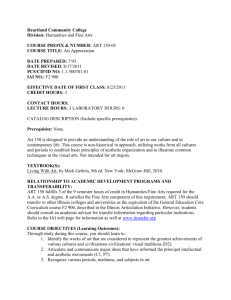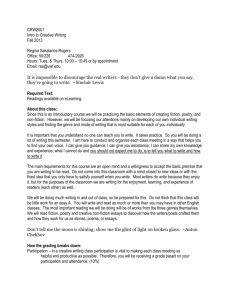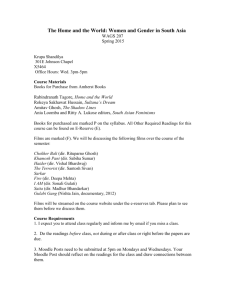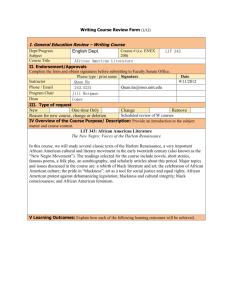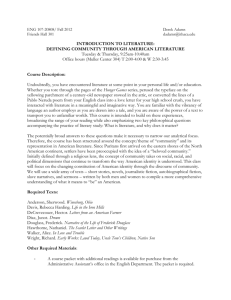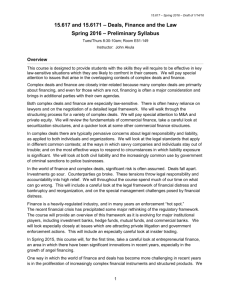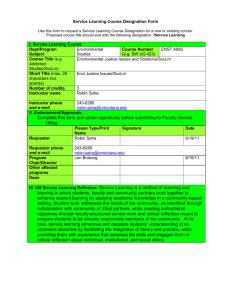I. General Education Review – Writing Course
advertisement
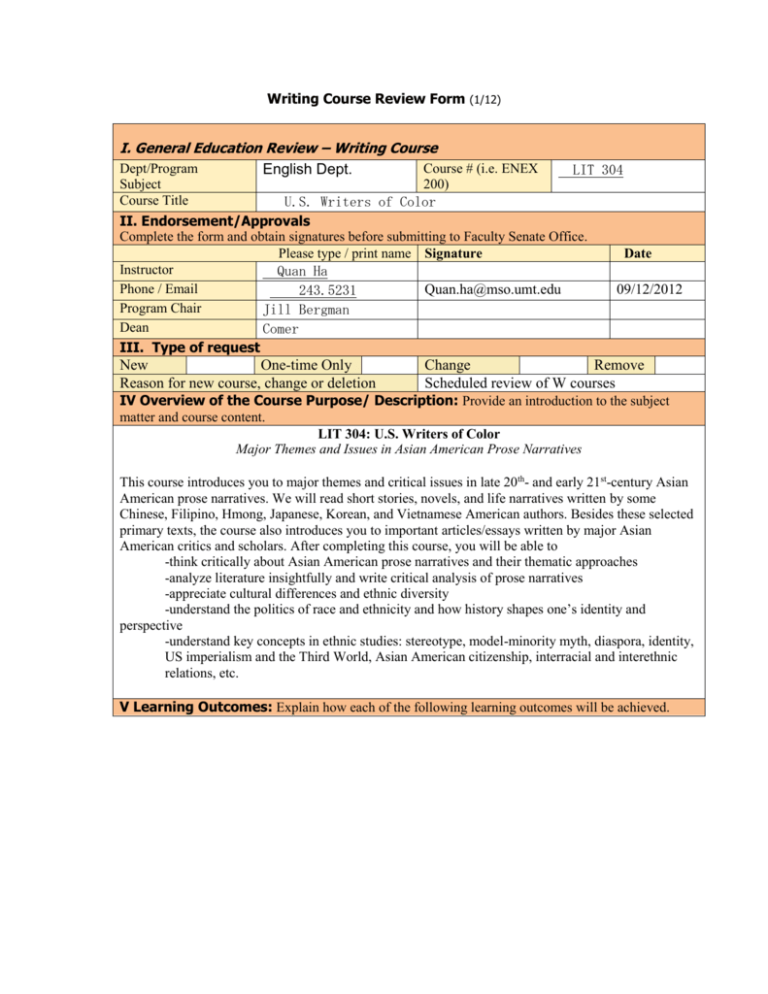
Writing Course Review Form (1/12) I. General Education Review – Writing Course Dept/Program Course # (i.e. ENEX English Dept. LIT 304 Subject 200) Course Title U.S. Writers of Color II. Endorsement/Approvals Complete the form and obtain signatures before submitting to Faculty Senate Office. Please type / print name Signature Date Instructor Quan Ha Phone / Email Quan.ha@mso.umt.edu 09/12/2012 243.5231 Program Chair Jill Bergman Dean Comer III. Type of request New One-time Only Reason for new course, change or deletion Change Remove Scheduled review of W courses IV Overview of the Course Purpose/ Description: Provide an introduction to the subject matter and course content. LIT 304: U.S. Writers of Color Major Themes and Issues in Asian American Prose Narratives This course introduces you to major themes and critical issues in late 20th- and early 21st-century Asian American prose narratives. We will read short stories, novels, and life narratives written by some Chinese, Filipino, Hmong, Japanese, Korean, and Vietnamese American authors. Besides these selected primary texts, the course also introduces you to important articles/essays written by major Asian American critics and scholars. After completing this course, you will be able to -think critically about Asian American prose narratives and their thematic approaches -analyze literature insightfully and write critical analysis of prose narratives -appreciate cultural differences and ethnic diversity -understand the politics of race and ethnicity and how history shapes one’s identity and perspective -understand key concepts in ethnic studies: stereotype, model-minority myth, diaspora, identity, US imperialism and the Third World, Asian American citizenship, interracial and interethnic relations, etc. V Learning Outcomes: Explain how each of the following learning outcomes will be achieved. Student learning outcomes : Use writing to learn and synthesize new concepts Formulate and express written opinions and ideas that are developed, logical, and organized Compose written documents that are appropriate for a given audience, purpose and context Revise written work based on constructive comments from the instructor Find, evaluate, and use information effectively and ethically (see http://www.lib.umt.edu/informationliteracy/) Begin to use discipline-specific writing conventions Demonstrate appropriate English language usage VI. Writing Course Requirements Enrollment is capped at 25 students. If not, list maximum course enrollment. Explain how outcomes will be adequately met for this number of students. Justify the request for variance. What instructional methods will be used to teach students to write for specific audiences, purposes, and genres? Students are required to write two major research essays (7 pages/essay), in which they present an argument and integrate research into their critical interpretation/analysis of a literary text. In addition, they must turn in a 3-page response paper. The two in-class exams ask students to write a 250-word paragraph to answer each exam question. There are 5 questions in each exam, which requires students to formulate their thoughts logically in a timeconstrained environment and tests their ability to articulate their thoughts succinctly within a paragraph. Each essay must follow the formal format of an academic paper. Students must be able to state a strong argumentative thesis statement strongly, write solid topic sentences, and develop coherent paragraphs while maintaining the coherence and unity of the essay as a whole. Specific examples and evidence are required to reinforce their argument. All essays and exam answers must use formal, standard English. The audience is assumed to be an academic person familiar with the field. Students have one week, after they receive their essays back, to revise their works based on the instructor’s feedback. Students must familiarize themselves with scholarly, academic, and reliable sources. Their research sources must be books in print or articles accessed via the Library’s databases. Legal actions will be taken against plagiarism. Students must follow the MLA style for grammar usage, punctuation conventions, documentations and citations. Standard modern American English and proper mechanics. Each student is required to meet with the instructor at least a week before a paper is due to discuss a possible topic and an outline for his/her essay. Then, he/she is required to meet with the instructor again to go over the strengths and weaknesses of his/her essay in the instructor’s office. Students are suggested to consult handbooks on academic writing to learn about the writing conventions. In their face-to-face meetings with the instructor, he will discuss his expectations and suggest books that students should consult to overcome their writing weaknesses. Which written assignments will include revision in There will be two required revisions for the response to instructor’s feedback? two formal essays. No grade will be assigned until the revisions are turned in. VII. Writing Assignments: Please describe course assignments. Students should be required to individually compose at least 16 pages of writing for assessment. At least 50% of the course grade should be based on students’ performance on writing assignments. Clear expression, quality, and accuracy of content are considered an integral part of the grade on any writing assignment. Formal Graded Assignments 70% Informal Ungraded Assignments 20% VIII. Syllabus: Paste syllabus below or attach and send digital copy with form. For assistance on syllabus preparation see: http://teaching.berkeley.edu/bgd/syllabus.html The syllabus must include the following: 1. Writing outcomes 2. Information literacy expectations 3. Detailed requirements for all writing assignments or append writing assignment instructions Paste syllabus here. SPRING 2012 LIT 304: U.S. Writers of Color Major Themes and Issues in Asian American Prose Narratives Instructor: Quan M. Ha, Ph.D. Office hours: Tues + Thurs: 12:30-2:00 & by appointment Class meetings: Tues + Thurs: 2:10-3:30 PM E-mail: quan.ha@mso.umt.edu Office: LA 213 Classroom: SS 254 Objectives and Expected Outcomes This course introduces you to major themes and critical issues in late 20th- and early 21st-century Asian American prose narratives. We will read short stories, novels, and life narratives written by some Chinese, Filipino, Hmong, Japanese, Korean, and Vietnamese American authors. Besides these selected primary texts, the course also introduces you to important articles/essays written by major Asian American critics and scholars. After completing this course, you will be able to -think critically about Asian American prose narratives and their thematic approaches -analyze literature insightfully and write critical analysis of prose narratives -appreciate cultural differences and ethnic diversity -understand the politics of race and ethnicity and how history shapes one’s identity and perspective -understand key concepts in ethnic studies: stereotype, model-minority myth, diaspora, identity, US imperialism and the Third World, Asian American citizenship, interracial and interethnic relations, etc. 8 Required Texts + 1 coursepack Lac Su, I Love Yous Are for White People. ISBN: 978-0061543661 John Okada, No-No Boy. ISBN: 978-0295-955254 Kao Kalia Yang, The Latehomecomer: A Hmong Family Memoir. ISBN: 978-1-56689-208-7 Chang-Rae Lee, Native Speaker. ISBN: 978-1573225311 Carlos Bulosan, America Is in the Heart. ISBN-10: 029595289X Maxine Hong Kingston, China Men. ISBN: 978-0679723288 Amy Chua, Battle Hymn of the Tiger Mother. ISBN: 9781594202841 Wu, Frank H. Yellow: Race in America beyond Black and White. ISBN: 9780.465.006403 Coursepack will be sent to your email as an attachment Classroom policies 1. You are not allowed to read newspapers or class-unrelated materials while class is in session. 2. The use of cell phones, beepers, or other electronic devices is prohibited during class. 3. Any persistent talking or sleeping while the instructor or another student is speaking will result in (1) a warning and (2) then your dismissal from the classroom. 4. You are permitted to use laptops during class for note-taking and other class-related work only. 5. Behave in a courteous and respectful manner toward your instructor and your fellow students. E-mail correspondence Use your UM e-mail account for electronic correspondence with the instructor. You may expect my response within 48 hours (except weekends and holidays). I expect you to use a professional tone in your correspondence with me. E-mails that have no greeting or express a disrespectful tone will not be answered. Attendance and Tardiness 1. Tardiness of between 5 and 10 minutes will be noted: each such tardiness after the first two will be counted as an unexcused absence; tardiness of 20 minutes or longer will be treated as an unexcused absence. 2. If you have to leave class early due to personal problems, inform me before class starts. 3. You are allowed TWO free absences. After your second unexcused absence, 25 points will be deducted for each additional absence. More than 6 unexcused absences will result in the failure of the course. 4. If you miss no class, I will add 10 bonus points to your final grade. Assignments TWO FORMAL ESSAYS (1,800-2,000 words/essay): Specific instructions to be announced. ONE ORAL PRESENTATION + ONE RESPONSE PAPER (1,000-1,200 words): You will present your critical understanding of the text(s) assigned for the date you have signed up for. Then, turn in your response paper on the date indicated in the syllabus. ONE EXAM (in class): Specific instructions to be announced READING QUIZZES: At the beginning of each class meeting, we will have a reading quiz (1015 points/each) until you earn the total of 300 points on all quizzes. Grades Grades will be assigned as percentage scores (0-1000) throughout the term. Ultimately, your final grade will be converted to the university’s letter grade system using this scale: A+ (970-1000) B+ (870-899) C+ (770-799) D (650-699) A (940-960) B (840-860) C (740-760) F (640 or below) A- (900-930) B- (800-830) C- (700-730) Reading quizzes------------------------------ -------------------------------------300 points Two major essays-------------------------------------------------------------------400 points (200 points/each) One exam---------------------------------------------------------------------------100 points Oral presentation--------------------------------------------------------------------50 points Response paper----------------------------------------------------------------------100 points Active participation in class discussion-----------------------------------------50 points TOTAL: 1,000 points Policies on written assignments and in-class tests 1. Late papers will be penalized with a 10% deduction for each day after the due date, including weekend days. If extenuating circumstances prevent you from turning in a paper on time, please talk to me BEFORE the paper is due. I am not likely to make allowances after the deadline has come and gone. 2. All papers are to be typed in 12-point font, Times New Roman, double-spaced. Please follow the MLA guidelines for formatting, citations, and documentations. 3. For each formal essay, you will have one week to enter all of my corrections and turn in the revised version. Failing to do this will result in a zero on the assignment. 4. Do not ask me to proofread your essays electronically (via email). If you need help with your papers, please schedule an appointment, or just come during my office hours. 5. Make-up assignments are for excused absences only. If you are late and miss a quiz, you may not take it again. Grade Appeals If you wish to appeal a grade, you should first consult with me. You will have 7 days, from the time the grade is assigned/posted, to set up an appointment with me to discuss the grade. After 7 days, all grades are final. Accommodations Students with disabilities will receive reasonable accommodations for coursework. To request accommodation, please contact me as soon as possible in the semester. I will work with you and Disability Services in the accommodation process. For more information, visit the Disability Services website at http://www.umt.edu/dss/ or call 406.243.2243 (Voice/Text). Academic Integrity Refer to http://life.umt.edu/VPSA/Student_Conduct.php. for information about academic misconduct. If you are found guilty of academic misconduct, legal action will be taken. It is your responsibility as a student to understand the Student Conduct Code described in the link above. Schedule of Readings (subject to change; the symbol [●] indicates readings from the coursepack) WEEK 1: Jan. 23-29 Tues: Introduction & Syllabus; What Is Asian American Literature? Thurs: Rivers + A Day in the Life + On the Perfume [● / short stories] WEEK 2: Jan. 30-Feb. 5 Tues: Yellow: Chapters 1 & 2 Thurs: I Love Yous Are for White People (pp. 1-131) JACOB G. WILLIAM M. DELONA R. WEEK 3: Feb. 6-12 Tues: I Love Yous Are for White People (pp. 132-end) TAYLEE F. Thurs: Better Homes and Gardens + Arthur Arellano + The Other Woman [● / short stories] KAITLIN K. WEEK 4: Feb. 13-19 Tues: Battle Hymn of the Tiger Mother (entire book) ROBERT F. Thurs: Research Paper Workshop ********Presenters of Weeks 1 + 2 + 3: Response paper due WEEK 5: Feb. 20-26 Tues: Yellow: Chapters 3 & 4 ANDREW H. Thurs: No-No Boy (pp. 1-116) AMANDA P. ********Presenters of Weeks 4 + 5: Response paper due WEEK 6: Feb. 27-Mar. 4 Tues: No-No Boy (pp. 117-end) GRAHAME W. Thurs: The Palmist + Slingshot + Close to the Bones [● / short stories] ► ESSAY # 1 due WEEK 7: Mar. 5-11 Tues: Native Speaker (pp. 1-130) Thurs: Native Speaker (pp. 131-230) SARAH P. ZACH H. LANDON L. WEEK 8: Mar. 12-18 Tues: Native Speaker (pp. 231-end) PATRICIA N. Thurs: Juan’s “Beyond Identity Politics …” + Lee’s “Asian American Lit. and the Resistances of Theory” + Kim’s “Defining Asian American Realities through Lit.” [● / articles] MARAH N. + COREY W. ******Presenters of Weeks 6 + 7 + 8: Response paper due WEEK 9: Mar. 19-25 Tues: At the Love Leather + Everything Must Go + Fire [● / short stories] ANDREA M. Thurs: America Is in the Heart (pp. 1-160) LAURA M. WEEK 10: Mar. 26-Apr. 1 Tues: America Is in the Heart (pp. 161-end) MADISON G. Thurs: Yellow: Chapters 5 & 6 JONATHAN C. ********Presenters of Weeks 9 + 10: Response paper due WEEK 11: Apr. 2-8 NO CLASS / SPRING BREAK WEEK12: Apr. 9-15 Tues: The Latehomecomer (entire book) JOHN L. (1ST half) + KATHY A. (2nd half) Thurs: Koshy’s “Morphing Race Into Ethnicity…” + “The Fiction of Asian American Literature” [● / articles] ALISSA S. ► ESSAY # 2 due WEEK 13: Apr. 16-22 Tues: China Men (pp. 1-150) BEAU H. Thurs: China Men (pp. 151-end) BRITTANY D. ********Presenters of Weeks 12 + 13 + 14: Response paper due (my office) WEEK 14: Apr. 23-29 Tues: Yellow: Chapters 7 & 8 Thurs: Review and conclusion FINAL EXAM: TBA QUINN B.



